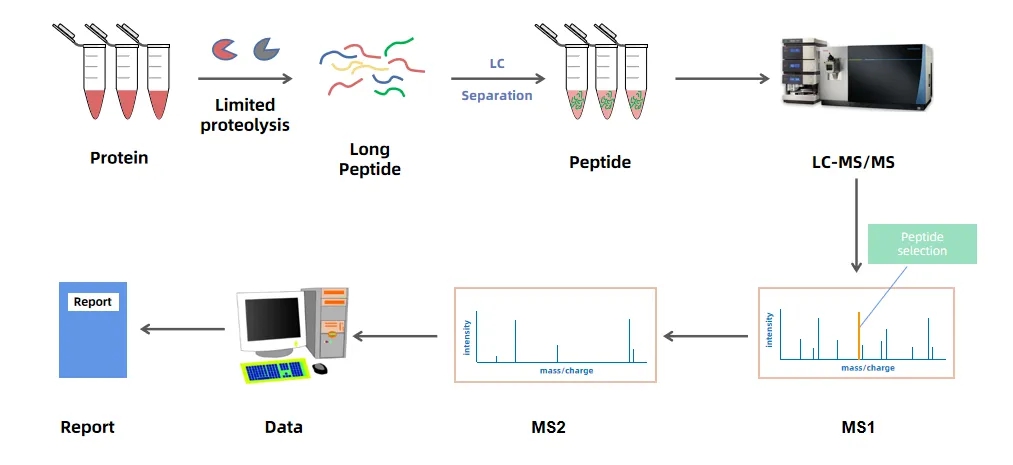Middle-Down MS-Based Post-Translational Modification Analysis Service
MtoZ Biolabs provides Middle-Down MS-Based Post-Translational Modification (PTM) Analysis Service that enables the characterization of protein modifications while preserving broader structural context. Positioned between bottom-up and top-down proteomics, this strategy analyzes large proteolytic fragments, allowing direct observation of coexisting PTMs and uncovering modification patterns that are often lost in peptide-level approaches.
By combining limited proteolysis, advanced LC-MS/MS, and expert data interpretation, MtoZ Biolabs delivers high-confidence identification, quantification, and localization of PTMs across diverse biological samples. This approach is ideal for studying complex proteins such as histones, signaling regulators, and therapeutic antibodies.
Overview
The Middle-Down MS-Based Post-Translational Modification Analysis Service focuses on the study of medium-sized polypeptides ranging from 5 to 20 kilodaltons. These large fragments are typically generated through controlled enzymatic digestion using GluC, AspN, or LysC, instead of trypsin. Retaining extended sequence context allows simultaneous identification of multiple modification sites within the same region of a protein.
Using high-resolution LC MS/MS combined with fragmentation techniques such as Electron Capture Dissociation (ECD) and Electron Transfer Dissociation (ETD), this workflow preserves labile PTMs and provides accurate localization of each modification. The approach is ideal for analyzing histone tails, antibody fragments, and signaling proteins that carry combinatorial PTMs.
By integrating limited proteolysis, chromatographic separation, and advanced mass spectrometry, MtoZ Biolabs delivers deep molecular insight into modification patterns, proteoform heterogeneity, and functional relationships across biological samples.
Analysis Workflow
The Middle-Down MS-Based Post-Translational Modification Analysis Service combines precision enzymology with high-resolution MS and advanced bioinformatics.
1. Project Consultation: Define experimental objectives, sample type, and enzyme strategy.
2. Controlled Proteolysis: Perform limited digestion to generate large fragments retaining PTM connectivity; purify via HPLC or size-based fractionation.
3. LC-MS/MS Acquisition: Orbitrap and timsTOF systems employ ECD, ETD, or HCD to map modification sites with high accuracy.
4. Data Processing: Dedicated algorithms identify proteoforms, quantify modifications, and visualize PTM relationships.
5. Comprehensive Reporting: Deliver annotated spectra, sequence maps, and statistical summaries suitable for publication or regulatory use.

Figure 1. Middle-Down MS-Based Post-Translational Modification Analysis Workflow
Why Choose MtoZ Biolabs?
✔ Extensive PTM Expertise: Specialized in phosphorylation, methylation, acetylation, and glycosylation analysis
✔ Cutting-Edge Platforms: Orbitrap and FT-ICR instruments ensure high mass accuracy and reproducibility
✔ Labile PTM Preservation: Optimized dissociation modes maintain modification integrity during fragmentation
✔ Tailored Workflows: Flexible digestion and analysis strategies to meet diverse research needs
✔ Data-Driven Insight: Integrated bioinformatics tools transform complex spectral data into biological interpretation
✔ One-Time-Charge: Our pricing is transparent, no hidden fees or additional costs.
Sample Submission Suggestions

Note: Provide details on sample collection and handling. If you need further details, our technical support team is happy to assist and provide comprehensive guidance on sample submission.
Applications
● Combinatorial PTM Analysis: Detect multiple modifications on the same peptide segment to study regulatory interactions.
● Histone and Epigenetic Research: Profile methylation, acetylation, and phosphorylation patterns shaping chromatin dynamics.
● Therapeutic Protein Characterization: Assess partial digestion products of monoclonal antibodies and other biologics.
● Functional Proteomics: Correlate PTM changes with protein structure, stability, and activity.
● Quantitative Comparison: Measure modification occupancy across treatments or physiological states.
The Middle-Down MS-Based Post-Translational Modification Analysis Service offers a balanced and powerful solution for detailed PTM characterization. Combining advanced mass spectrometry with refined digestion chemistry, MtoZ Biolabs provides reproducible, high-quality results that enhance understanding of protein regulation and therapeutic design.
Contact MtoZ Biolabs today for a free consultation and tailored experimental plan.







